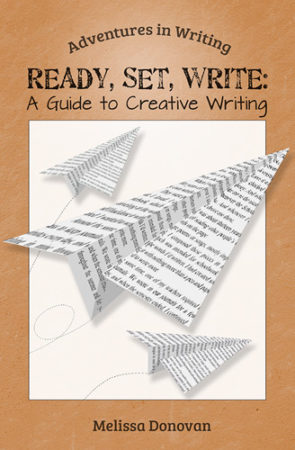Today I’m sharing an excerpt from Ready, Set, Write! But first let me tell you about the book:
 Ready, Set, Write is an introduction to creative writing that is ideal for young and new writers but also works as a refresher for seasoned writers. It takes you on a tour through various forms of creative writing. You’ll answer questions about writing that are designed to help you understand and improve your writing practice and process, and you’ll try some writing activities. You’ll learn how to stay motivated and inspired, and you’ll put together your own writer’s tool kit, packed with everything you need to do your work. Plus, you’ll get tons of writing tips to help you write more and write better.
Ready, Set, Write is an introduction to creative writing that is ideal for young and new writers but also works as a refresher for seasoned writers. It takes you on a tour through various forms of creative writing. You’ll answer questions about writing that are designed to help you understand and improve your writing practice and process, and you’ll try some writing activities. You’ll learn how to stay motivated and inspired, and you’ll put together your own writer’s tool kit, packed with everything you need to do your work. Plus, you’ll get tons of writing tips to help you write more and write better.
The following excerpt is from chapter two, which is titled “Why We Write.” Enjoy!
Why We Write
There are many reasons to write. Maybe you feel a need to express yourself. Perhaps you use writing to clear your mind or figure out what you think or how you feel about something. You might write because you’re gripped by ideas and images, and writing allows you to explore them. Maybe you use writing as a tool for some other objective: sharing your ideas, experiences, or knowledge with others. Or perhaps you want to make a career of it, to use writing as a way to support yourself.
There’s no right or wrong reason to write—and there’s no good or bad reason to write. If you are compelled to put words on the page, then you should put words on the page.
At its core, writing is a form of communication, a way to connect with an audience. Some people have been fundamentally changed by a speech, a novel, or a poem. Almost everyone has been moved by a story or a song. And a few have been persuaded to new viewpoints or motivated to engage in some action or activity by the sheer act of reading what another person has written. In the hands of a passionate and skilled writer and in front of a willing and ready audience, a piece of writing can shake the world
But not all words are written to be shared. Many people use writing for self-expression or even for therapeutic purposes. Troubling emotions are often alleviated by putting them into words: feelings of rage, sorrow, pain, and suffering. And this gives writing an even greater power: the power to heal, to bring about inner peace and wellness.
Therapeutic writing doesn’t have to focus on the negative. For example, a daily gratitude journal emphasizes the good things in life, promoting a healthy attitude and positive outlook on the world.
And sometimes writing is just plain fun. You can make language dance. You can create worlds. You can explore the past and invent the future.
All for the cost of a pen and a notebook.
What is a Writer?
Occasionally you’ll hear people arguing that one can’t be a writer until one has earned money from writing, or that a “real” writer is someone who would die of heartache if they stopped writing. This is hyperbole, pure nonsense.
A writer is someone who writes, someone who uses the written word to communicate with others or express their ideas. A writer writes regularly but might not write frequently. Some writers write a lot. Some write a little. But all writers do one thing: we write.
Nobody gets to tell you how to be a writer. Nobody gets to invalidate your reasons for writing, or what you’re writing, or how you’re writing. Nobody gets to tell you when or where to write.
Who Do You Write For?
I tend to think of an author as someone who has written professionally, for an audience.
Many people write for nobody other than themselves. They keep journals or diaries that are never seen by another pair of eyes, or they write and publish books, caring little if anyone reads or even likes their work.
But many writers yearn for readers or want to make a career of their writing, even if it’s only something they do on the side. They write for an audience. The audience might change over time. First we write for ourselves, then perhaps for our friends and family. Later we might put our writing in front of a small audience—on a blog or in a workshop. Eventually we seek agents and editors. And finally, we seek a readership, people who will pay to read what we write.
Whether you only write for yourself or you’ve set a goal to become a successful, published author, it’s up to you to decide why you write and who you’re writing for.
Questions
Are you a writer? Do you want to be an author? Why do you write? Who do you write for?
Want more?
Pick up a copy of Ready, Set, Write today!






I can’t wait for your book to come out!
I am a writer who wants to be an author. I write because it’s the only thing I enjoy doing and want to do forever and ever. I enjoy putting words onto the page. I write for people who want to write consistently and who have big dreams like myself.
Thank you so much, Renayle! I’m excited to share this new book with fellow writers! Keep writing!
I’m looking forward to your new book. I write because I can’t not write. Writing is in my DNA. I’m working on a novel and a collection of short stories, both of which I’m in the category of new writer. I write blog posts for three sites and I teach a journaling class (I have journaled almost sixty years, have journaled over 8,200 hand-written pages since September 8, 2002, and I have journaled daily since November 8, 2012.) I hope to have my website up and running by June 1, 2019. Thank you for your great newsletter and website. I also have 1200 Creative Writing Prompts,” “101 Creative Writing Exercises,” and “Story Drills,” all of which I enjoy and find quite useful.
Hi Billie. I’m the same way: I have to write. It doesn’t really feel like a choice. The new book will be out within a week or two, and I’ll be posting an announcement here at Writing Forward as soon as it’s available.